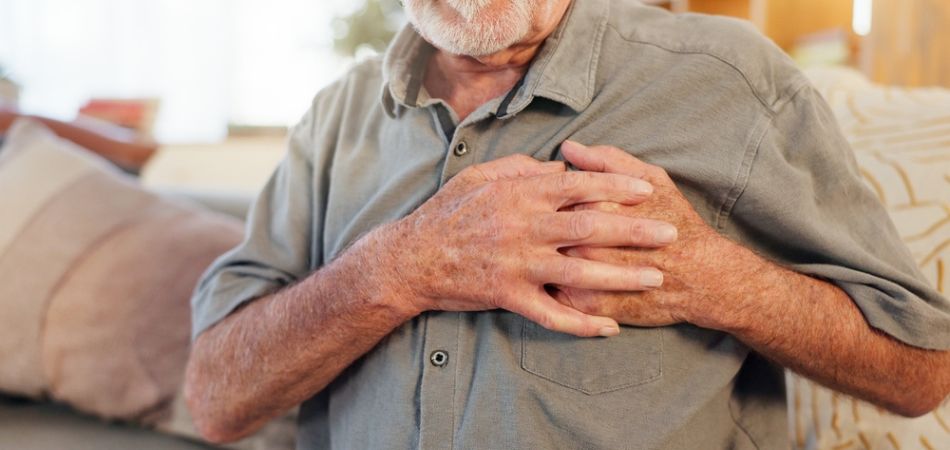Last Updated:
November 25th, 2025
Likely every one of us, at some point, has dismissed some of the inevitable twinges and aches that follow a night of drinking. We tell ourselves, “it’s only temporary, it will pass…”
But what happens when we’re dismissing a sign that will not fade, with potentially fatal consequences?
Chest pain after alcohol might be your body’s way of warning that something is deeply wrong, and that it’s time to take action.

What is alcohol-related chest pain?
Regardless of where the pain is stemming from, experiencing chest disturbances can be alarming. Immediately, the mind can race to think “heart attack” or “seizure,” and panic only compounds your distress.
Of course, not all pain in the chest is related to drinking, but there are common types of pain that heavy drinkers feel in the chest area. Descriptions of these forms of pain include sensations of stabbing, shooting, aching, dull, or burning.
Being a large area of the body, the source of chest pain could be related to many key organs, including the lungs, digestive system, heart, muscles or even the nervous system. Consequently, it can be difficult to trace the source of pain to one organ, but learning about alcohol’s effects on the organs of the upper body can help you take preventative steps.
Chest pains from alcohol use might be felt within an hour of drinking, or during the following few days. More serious effects can be felt weeks and months after heavy drinking sessions, and regardless of where the pain is localised, your body may be signalling that alcohol is causing serious and potentially fatal damage internally.
Why am I feeling chest pain after drinking alcohol?
Chest pain after alcohol use could stem from several interconnected systems in the body. Alcohol is well understood to impair and damage almost every major organ across the human body, and the relationships across organs may indicate that professional medical help is needed:
Alcohol’s depressant effect on the heart also means it slows heart function, and after heavy drinking, some people experience what cardiologists call “holiday heart syndrome,” which is irregular or rapid heart rhythms that cause a fluttering sensation and localised chest pains.
The overlap between digestive and heart-related discomfort is one reason why people might confuse acid reflux with angina. Generally, if the pain is radiating upwards or is felt alongside bloating, it stems from stomach irritation, rather than a heart condition, though both can warrant medical help if severe.
While anxiety-induced pain or discomfort may not be dangerous, it can be highly distressing. Understanding that these sensations come from the body’s withdrawal from heavy drinking might help you respond more calmly and get the professional help you need.
Is chest pain after drinking a medical emergency?
If you’re going through chest pain after consuming alcohol, you need to pay close attention to the type of pain, how long it lasts and any co-occurring symptoms. Some of the signs that may be signalling the start of a medical emergency include:
Symptoms that may be the start of a heart-related event
Early stages of a severe heart-related event are:
- A crushing, radiating, or squeezing pain stretching to the arm, back, or jaw
- Shortness of breath leading to cold sweats and nausea
- Worsening and persistent physical capabilities
- An acute feeling of dread or intense lightheadedness
These symptoms are often linked with the onset of panic attacks and cardiac arrest. They should never be ignored, and emergency teams should be contacted.
Is my chest pain related to a hangover or withdrawal?
If your chest pain appears the morning after drinking, it could be linked to either hangover symptoms or early alcohol withdrawal, depending on your drinking habits.
During a hangover, dehydration, low blood sugar and increased inflammation can cause muscle tightness or heart palpitations that feel like chest pain. These symptoms tend to ease within 24 hours as the body rehydrates and rebalances itself.
However, when your body is dependent on alcohol, suddenly stopping or cutting back can trigger a surge in stress hormones. You’re also likely to experience a raised heart rate and blood pressure, alongside trembling, sweating and chest tightness that mimics cardiac pain.
If the pains are only hangover-related, they should be short-lived. Chest pains as an alcohol withdrawal symptom, however, usually demand medical attention. In such a case, withdrawal may become life-threatening if it isn’t professionally supported.
How can I help reduce chest pain after drinking?
If you’re experiencing some chest discomfort after drinking, there are some steps you can take to help your body recover and reduce strain on the heart and digestive system:
- Focus on hydration and rest: Alcohol is known as a potent diuretic, meaning it drains your body of fluids. Drink plenty of water and electrolyte solutions to restore balance the day after drinking. Give your body time to rest, avoiding caffeine if you know it further increases your heart rate and anxiety.
- Eat nutritionally valuable, non-acidic foods: Opt for light, nourishing meals such as soups, fruit, and whole grains. Avoid acidic or spicy foods that irritate the stomach lining or worsen reflux symptoms. Gentle nutrition helps your body rebalance blood sugar and reduces inflammation.
- Try not to lie down for too long: If you’re dealing with reflux-related pains, lying flat too soon after drinking or eating might make the discomfort worse. Try to stay upright for at least two hours after meals and, if possible, try to sleep with your upper body slightly elevated to stop acid from moving upwards.
I need help right now with alcohol addiction
If chest pain is becoming more common as you drink, you may have to seriously rethink your relationship with alcohol and take proactive steps to remove it from your life, for good.
Here at UKAT, we specialise in alcohol rehab treatment that addresses the whole person. Our trained staff delivers medical alcohol detox to help manage dangerous withdrawal symptoms. Evidence-based therapies are in place to help you address the underlying drivers of the addiction, and aftercare reinforces your long-term recovery journey.
Don’t hesitate to reach out. Our team is ready to help you step into the brighter, sober future you deserve.
(Click here to see works cited)
- “Alcohol’s Effects on the Body.” National Institute on Alcohol Abuse and Alcoholism, U.S. Department of Health and Human Services, www.niaaa.nih.gov/alcohols-effects-health/alcohols-effects-body
- “How Alcohol Affects Blood Pressure and the Heart.” HSE.Ie, www2.hse.ie/living-well/alcohol/health/effects-on-your-body/blood-pressure
- Jain A, Yelamanchili VS, Brown KN, et al. Holiday Heart Syndrome. [Updated 2024 Jan 16]. In: StatPearls [Internet]. Treasure Island (FL): StatPearls Publishing; 2025 Jan-. Available from: https://www.ncbi.nlm.nih.gov/books/NBK537185/



